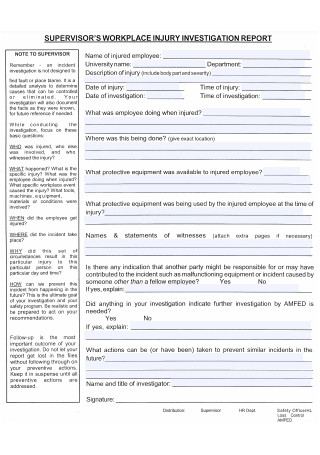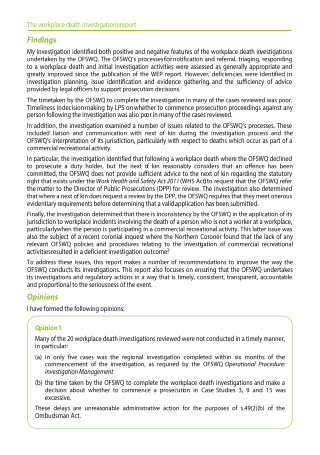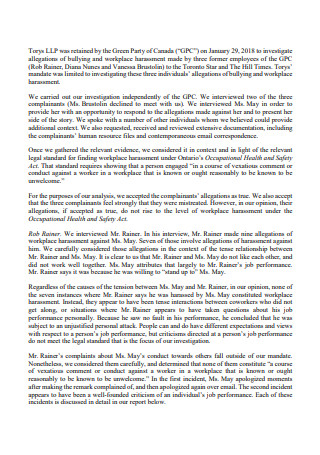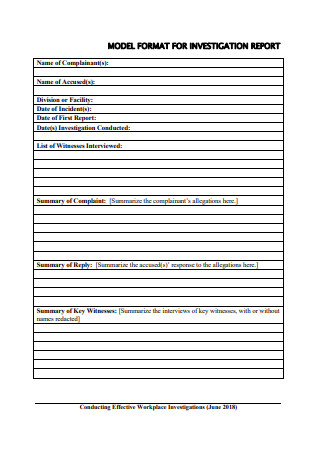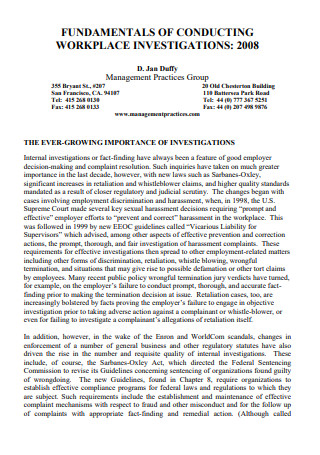4+ Sample Workplace Investigation Report
FREE Workplace Investigation Report s to Download
4+ Sample Workplace Investigation Report
What Is a Workplace Investigation?
Benefits of Workplace Investigation
Tips to Perform an Investigation
How to Conduct a Successful Workplace Investigation
FAQs
What is the main purpose of the investigation?
What is a progress investigation report?
What makes a good report?
What Is a Workplace Investigation?
An investigation may sound like a daunting term, but it may be the only way to handle a problematic issue if a worrying problem arises in the workplace. An investigation in the workplace is analyzing a dispute between or among employees. The examination and evaluation attempt to investigate the claims in-depth, ascertain and evaluate the facts, and determine whether the employee has engaged in misconduct. Typically, representatives of human resources do this type of examination and investigation. According to statistics, 41% of psychological damage claims involve workplace bullying and harassment or exposure to workplace violence.
Benefits of Workplace Investigation
Employers perform workplace investigations in response to complaints from an employee, contractor, intern, or another individual, especially if illegal harassment, discrimination, or retaliation is alleged. Employers must conduct investigations to fulfill their legal responsibilities to prevent and remedy workplace discrimination, harassment, and revenge. There are numerous advantages to achieving a successful workplace inquiry. Your time and effort, whether spent conducting the investigation or collaborating with an external investigator, can be highly beneficial to your organization for some reasons.
Tips to Perform an Investigation
When an employee makes a written or informal complaint, the employer must take quick action to end the alleged disagreement, safeguard all individuals involved, and initiate an investigation. In addition, the employer must take relevant corrective measures to ensure that illegal activities and behaviors cease immediately. Not only will responsiveness to a complaint and investigation offers essential information and evidence, but it will also boost the credibility of both the investigator and the employer. Investigations can aid a business in identifying and resolving internal issues before they become pervasive. Employers should investigate every case so that it can be presented in court, given that every complaint can potentially result in a lawsuit. As annoying as investigations can be, they must be swift, exhaustive, and efficient to ensure everyone’s safety. Once an employer gets a verbal or written complaint, the following measures should be taken.
1. Ensure Confidentiality
The employer must respect the confidentiality of employee claims. Moreover, the employer must conduct an immediate and thorough investigation. Therefore, it may not be possible to maintain the entire confidentiality of all information acquired during the initial complaint, such as interviews and documents. The employer should advise the complaining party and other individuals participating in the investigation that all developed material will be kept confidential to ensure a complete examination. It should also be made clear to conduct adequate research. Information will be disclosed to the accused and possible witnesses on a “need-to-know” basis. An employer should never guarantee perfect secrecy to any investigation participant.
2. Provide Interim Security
One of the initial concerns may be the necessity of taking urgent protective measures for the accuser or the alleged victim. Separating the alleged victim from the offender may be essential to prevent further harassment or retaliation. A schedule modification, transfer, or leave of absence may be necessary; nevertheless, complainants should not be transferred or burdened against their will. These activities could be perceived as retaliatory and result in an allegation of retaliation. Employer and accused must collaborate to reach an amicable resolution. Before making any decisions, employers may want to get legal counsel.
3. Select the Investigator
The investigator should be able to retain confidentially, be respected inside the organization (since their findings will be utilized to decide), act as a credible witness, and, if internal, have the potential to continue working for the company. Employers typically rely on seasoned HR personnel, internal security, legal counsel (internal or external), or a private investigator.
4. Develop a Strategy for the Investigation
For an investigation to be effective and effectively conducted, it must be organized. A comprehensive strategy should contain a summary of the issue, the construction of a witness list, information and evidence sources, interview questions designed to extract critical information and details, and a procedure for document retention. Utilizing all accessible materials will help the investigator establish a good strategy. In addition, various online and printed resources are accessible to provide assistance and even step-by-step instruction.
5. Develop Interview Questions
During the preparation phase, questions should be formulated in advance; however, new questions will be added throughout the inquiry as more evidence and information are given. Good interview questions are pertinent and geared to extract information without guiding the interviewee; they should be open-ended to elicit as much data as possible.
6. Conduct Interviews
Interviews can be done once the proper investigator has been chosen, an investigation strategy has been developed, and interview questions have been formulated. The investigator must advise all parties of the investigation’s necessity and explain the procedure. When emphasizing the confidentiality of the inquiry process, care must be taken to avoid interfering with workers’ rights to engage in the coordinated activity. The investigator must be impartial and objective to obtain and evaluate pertinent facts. It is vital to prevent the investigation from being steered in any specific way. Never provide a viewpoint or say anything to interviewees that could discredit their objectivity. Every interview must be conducted with impartiality. Taking notes, searching for contradictions, and searching for opportunities for further evidence and prospective witnesses should also be considered. Requesting that the employee write down what transpired may help uncover contradictions. There may be a discrepancy between the employee’s willingness to write and what they stated in the interview. Investigators must determine the credibility of personnel. Interviews reveal divergent and even contradictory accounts of the events. Consider that the matter is susceptible to the employees involved. Due to the personal and emotional nature of the issue, their perspectives of what transpired may be influenced by private interests. If their careers are at stake, they may even lie. During an inquiry, investigators must assess the credibility of the questioned individuals using tactics. When conducting interviews, investigators should be cautious to avoid harsh interrogation techniques that could result in accusations such as coerced false confessions and false detention.
7. Closure of Investigation
Once a decision is made, the manager should tell the employee who made the complaint and the accused employee. Let the person who made the complaint know that the organization took it seriously and did something about it. Even if the complainant disagrees with the results, the organization must make sure the person feels like they have been heard and understood. The investigator should set a time to check in with the complainant to ensure there are no more problems and that they are getting used to being back at work. The employer should encourage the complainant to talk to them and keep in touch until they feel safe again. Lastly, as needed, the investigator should remind everyone to keep things secret.
How to Conduct a Successful Workplace Investigation
If a problem or complaint has arisen at your organization, a thorough investigation will help you determine what occurred and what to do about it. It can also assist your organization in avoiding accountability for employee misconduct, but only if you act quickly and take appropriate measures to rectify the situation. Below are the seven steps for conducting a successful workplace investigation.
1. Consider conducting an investigation
Before donning your detective’s hat, consider whether an inquiry is essential. In a few instances, such as when all employees agree on what occurred or when the issue appears trivial, it may be reasonable to determine that a thorough investigation is unnecessary. Generally, it is preferable to err on the side of caution and perform an analysis. If the problem is more severe than it initially appeared, failure to investigate can result in legal difficulty and ongoing job issues. And sometimes, you cannot determine how prevalent or significant a problem is unless you do some investigating.
2. Immediately take action if necessary
If a situation is volatile or could potentially create imminent damage to your firm, you may need to act immediately — even before you begin your inquiry. Suppose an employee is accused of sexually abusing a coworker, stealing critical trade secrets, or bringing a weapon to work. In that case, you should likely temporarily suspend the employee with pay while investigating the allegations. But take care not to prejudge the matter or give the accused employee the impression that you have already decided.
3. Choose an investigator
You will need an investigator with expertise and training in investigation procedures, unbiased and viewed as impartial by the personnel involved, capable of functioning professionally, and, if required, testifying in court. You’re lucky if you already employ someone who fits this job description. If not, you can use a private investigator to handle the situation on your behalf.
4. Prepare an inquiry
Spend some time organizing your thoughts beforehand. Collect any information regarding the issue, such as an employee complaint, a supervisor’s report, written warnings, or problem-related materials. Using this information as a reference, consider what more information you’ll need to determine what happened. Who will you interview, and what questions will you pose? Exist extra documentation that employees or managers may possess? Has anyone witnessed significant occurrences — or should they have?
5. Perform interviews
The objective of any investigation is to obtain information, and the most fundamental method for doing so is to ask people questions. Most studies entail at least two interviews: one with the employee accused of wrongdoing and another with the employee who filed the complaint or was the victim. You will also need to interview witnesses who may have witnessed something crucial. When conducting interviews, you should ask as many open-ended questions as possible to extract as much information as feasible.
6. Collect and evaluate evidence
Documents — personnel files, email messages, corporate regulations, communications, and so on — will play a role in most investigations. In addition, many studies will ask you to collect additional evidence, such as narcotics, a weapon, photographs, or stolen property. Also, the most challenging aspect of many investigations is determining what occurred, primarily when witnesses dispute or contradict each other. There are several tried-and-true strategies for deciding where the truth lies — methods that we all use to get to the bottom of things in our daily lives. Consider, for instance, whose story makes the most sense, whose demeanor was the most persuasive, and who has a reason to deceive you. Sometimes, you have no option but to concede that you lack sufficient information to determine what occurred.
7. Investigate and report
After determining what occurred, you must decide what to do about it. If you choose that severe misbehavior has occurred, you must take swift disciplinary action to avoid legal culpability for the employee’s activities and to protect your organization and other employees. In addition, once your research is complete, you should compose a report explaining what you did and why. This will protect the organization against lawsuits related to the investigation and offer a written record if the same employee misbehaves in the future (s). Your report should explain, among other things, how and when the problem was brought to the company’s attention, the interviews you conducted, the evidence you reviewed, the conclusions you reached, and what you did to address the issue.
FAQs
What is the main purpose of the investigation?
The objective of an investigation is to gather pertinent evidence to support or refute allegations of fraud and corruption. It is a legally established fact-finding procedure undertaken impartially and objectively to select the relevant facts and make recommendations about them.
What is a progress investigation report?
Progress reports, project completion reports, and brief investigative reports are informal, concise reports with attachments that rarely exceed three pages. Progress reports keep management informed of the task’s progress on lengthy projects.
What makes a good report?
Effective reports present and analyze facts and information pertinent to the problem or issue specified in the report short. All sources must be recognized and referenced by your department’s approved style.
It will help if you frequently inquire about the assigned employee when disturbing events occur at work. However, the procedure is complicated. It needs excessive effort and time. In addition, you must prepare a comprehensive report following the investigation. Utilize this workplace investigation report template the next time you investigate work. Visit our website and download it now!

